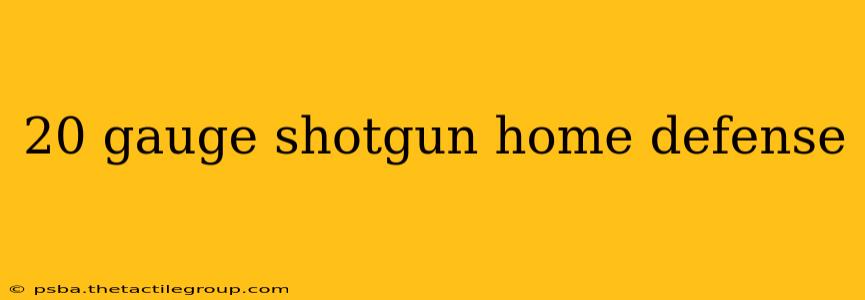Choosing the right firearm for home defense is a critical decision, demanding careful consideration of various factors. The 20-gauge shotgun frequently enters the conversation, and this guide will delve into its suitability for this crucial role. We'll explore its pros and cons, compare it to other popular choices, and ultimately help you decide if a 20-gauge is the right tool for your home defense needs.
Advantages of a 20 Gauge for Home Defense
The 20-gauge shotgun offers several compelling advantages for home defense:
-
Reduced Recoil: Compared to its 12-gauge counterpart, the 20-gauge boasts significantly less recoil. This is a major benefit, especially for smaller individuals or those less experienced with shotguns. Reduced recoil translates to faster follow-up shots and improved accuracy under stress.
-
Lighter Weight: The lighter weight of a 20-gauge shotgun contributes to easier handling and maneuverability, especially in confined spaces typical of a home environment. This is a significant advantage in close-quarters combat situations.
-
More Manageable for Smaller Shooters: For individuals with smaller frames, the reduced recoil and lighter weight of the 20-gauge make it a far more practical and comfortable option than a heavier 12-gauge.
-
Reduced Noise: While still loud, the 20-gauge generally produces less noise than a 12-gauge, potentially minimizing the impact on hearing both for the shooter and occupants of the home.
-
More Ammunition Capacity: While some might assume otherwise, many 20-gauge shotguns offer magazine capacities similar to, or even exceeding, that of some 12-gauge models.
Disadvantages of a 20 Gauge for Home Defense
Despite its advantages, the 20-gauge also has some drawbacks:
-
Less Stopping Power: Compared to the 12-gauge, the 20-gauge delivers less stopping power. This means that while it's still capable of incapacitating an attacker, it might require more precise shot placement and potentially more shots to achieve the same effect.
-
Limited Availability of Ammunition: While readily available, the selection of 20-gauge ammunition, particularly defensive rounds like buckshot and slugs, is generally smaller than that for 12-gauge.
20 Gauge vs. 12 Gauge for Home Defense: A Direct Comparison
The choice between a 20-gauge and a 12-gauge often comes down to individual physical capabilities and preferences. Here's a head-to-head comparison:
| Feature | 20 Gauge | 12 Gauge |
|---|---|---|
| Recoil | Lower | Higher |
| Weight | Lighter | Heavier |
| Stopping Power | Less | More |
| Ammunition Availability | Less varied | More varied |
| Shooter Comfort | More comfortable for smaller shooters | Can be less comfortable for smaller shooters |
| Cost | Often slightly less expensive | Often slightly more expensive |
Choosing the Right Home Defense Shotgun: Beyond Gauge
Selecting a shotgun for home defense isn't solely about the gauge. Consider these additional factors:
-
Length of Barrel: Shorter barrels are more maneuverable in tight spaces, but longer barrels may offer slightly improved accuracy.
-
Choke: Consider a cylinder bore choke for home defense to maximize the spread of shot.
-
Action Type: Pump-action, semi-automatic, and break-action shotguns all have their advantages and disadvantages.
-
Ergonomics: Choose a shotgun that fits comfortably in your hands and is easy to handle.
Conclusion: Is a 20 Gauge Right for You?
The 20-gauge shotgun presents a viable option for home defense, especially for smaller individuals or those seeking reduced recoil. However, it's crucial to weigh the trade-off between reduced recoil and potentially less stopping power. Consider your physical capabilities, comfort level with firearms, and the specific needs of your home environment before making a decision. Thorough training and practice are essential, regardless of the firearm chosen. Remember to always consult with local laws and regulations regarding firearm ownership and usage.

